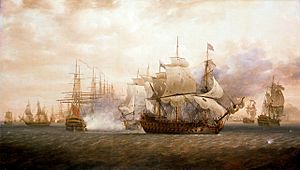HMS Alcide (1779) facts for kids

Battle of St Kitts
|
|
Quick facts for kids History |
|
|---|---|
| Name | HMS Alcide |
| Ordered | 31 August 1774 |
| Builder | Deptford Dockyard |
| Laid down | 4 June 1776 |
| Launched | 30 July 1779 |
| Fate | Broken up, 1817 |
| Notes | |
| General characteristics | |
| Class and type | Albion-class ship of the line |
| Tons burthen | 1625 |
| Length | 168 ft (51 m) (gundeck) |
| Depth of hold | 18 ft 10 in (5.74 m) |
| Propulsion | Sails |
| Sail plan | Full-rigged ship |
| Armament |
|
HMS Alcide was a powerful warship of the Royal Navy. Its name, Alcide, is a French and Italian version of "Alcides," another name for the Greek hero Heracles. This ship was a "74-gun third-rate ship of the line." This means it was a large warship with 74 cannons, designed to fight in a line formation during naval battles.
The ship was designed by Sir Thomas Slade. It was built by Adam Hayes at Deptford Dockyard in England. HMS Alcide was officially launched on July 30, 1779.
Contents
Life at Sea: HMS Alcide's Service
When HMS Alcide was first launched, Captain John Brisbane was its commander. The ship had a very large crew of 550 sailors. In January 1780, under Captain Brisbane, Alcide joined a major British attack. This attack was aimed at a group of ships called the Caracas convoy.
Key Battles and Adventures
HMS Alcide took part in several important battles. These battles happened during a time when Britain was often at war.
- Battle of Cape St. Vincent (1780): This was one of the first big battles for Alcide.
- Battle of Martinique (1780): Another major naval fight in the same year.
- Battle of St. Kitts (1782): Also known as the Battle of Frigate Bay, this was a key event.
- Battle of the Saintes (1782): Alcide played an important role in this battle.
On September 12, 1780, Alcide captured a ship named Pocahontas. This ship was a "letter of marque," meaning it was a private ship allowed to attack enemy vessels. The Royal Navy later used Pocahontas as one of their own ships.
In the Battle of the Saintes on April 12, 1782, Alcide was commanded by Captain Charles Thomson. It was the third ship in line to attack the French fleet. This shows how important its position was in the battle.
Operations in Corsica
In September 1793, Alcide was involved in operations near Corsica. During this time, it served as the main ship for Commodore Robert Linzee. This meant it was the flagship, carrying the commodore who led a group of ships.
Important Leaders and Crew
Many skilled naval officers commanded or served on HMS Alcide.
- Captain John Brisbane: He was the first commander of Alcide from 1779 to 1780.
- Captain Robert Linzee: He commanded the ship from 1792 to 1793. He later became a Rear Admiral.
- Lord Robert Manners: He served as a second lieutenant on the ship from 1779 to 1780.
The End of a Warship
In 1794, HMS Alcide returned to Portsmouth and was "paid off." This means it was taken out of active service. A survey found that it would be too expensive to repair the ship.
From 1802 until 1817, Alcide was used as a "receiving ship" in Portsmouth Dock. This means it was used as a floating base or barracks for new sailors. All of its guns were removed during this time.
Finally, in April 1817, HMS Alcide was "broken up" at Portsmouth. This means the ship was taken apart, and its materials were reused or discarded.

